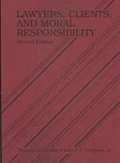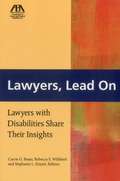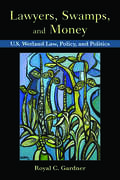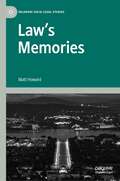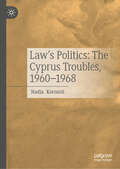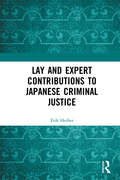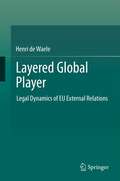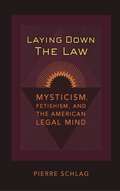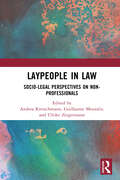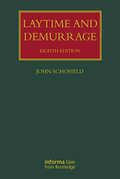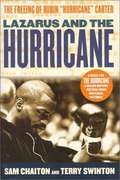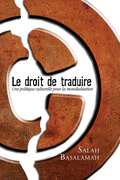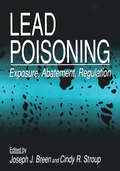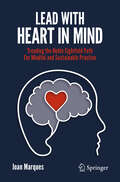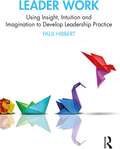- Table View
- List View
Lawyers, Clients and Moral Responsibility (2nd Edition)
by Robert F. Cochran Thomas L. ShafferThis second edition of the authors influential LAWYERS, CLIENTS, AND MORAL RESPONSIBILITY explores the place of moral and social values in the law office with the use of engaging stories, dialogues and discussion. The book presents a practical way for lawyers to raise and discuss moral issues with clients. It will serve as an engaging supplement to professional responsibility, client-counseling, and legal clinic courses. This second edition adds substantial discussion of the place of moral discourse within law firms and corporations, ways to engage the powerless client in moral discourse, and the place of social justice in client counseling.
Lawyers, Lead On: Lawyers with Disabilities Share Their Insights
by Rebecca S. Williford Carrie A. Basas Stephanie L. EnyartThis inspiring book contains letters of encouragement and advice from lawyers with disabilities to law students and new lawyers with disabilities. The writers share their perspectives on work and disability, based on their own experiences of success and setbacks.
Lawyers, Swamps, and Money: U.S. Wetland Law, Policy, and Politics
by Royal C GardnerLawyers, Swamps, and Money is an accessible, engaging guide to the complex set of laws governing America's wetlands. After explaining the importance of these critical natural areas, the book examines the evolution of federal law, principally the Clean Water Act, designed to protect them. Readers will first learn the basics of administrative law: how agencies receive and exercise their authority, how they actually make laws, and how stakeholders can influence their behavior through the Executive Branch, Congress, the courts, and the media. These core concepts provide a base of knowledge for successive discussions of: the geographic scope and activities covered by the Clean Water Act the curious relationship between the U.S. Army Corps of Engineers and the Environmental Protection Agency the goal of no net loss of wetlands the role of entrepreneurial wetland mitigation banking the tension between wetland mitigation bankers and in-lieu fee mitigation programs wetland regulation and private property rights. The book concludes with insightful policy recommendations to make wetlands law less ambiguous and more effective. A prominent legal scholar and wetlands expert, professor Royal C. Gardner has a rare knack for describing landmark cases and key statutes with uncommon clarity and even humor. Students of environmental law and policy and natural resource professionals will gain the thorough understanding of administrative law needed to navigate wetlands policy-and they may even enjoy it.
Law’s Abnegation
by Adrian VermeuleAdrian Vermeule argues that the arc of law has bent steadily toward deference to the administrative state, which has greater democratic legitimacy and technical competence to confront issues such as climate change, terrorism, and biotechnology. The state did not shove lawyers and judges out of the way; they moved freely to the margins of power.
Law’s Detour: Justice Displaced in the Bush Administration (Critical America #24)
by Peter MarguliesFrom the Justice Department’s memos defending coerced interrogation to Alberto Gonzales’ firing of U.S. Attorneys who did not fit the Bush Administration’s political needs, Law’s Detour paints an alarming picture of the many detours that George W. Bush and his allies created to thwart transparency and undermine the rule of law after September 11, 2001. Pursuing those detours, Bush officials set up a law-free zone at Guantánamo, ordered massive immigration raids that separated families, and screened candidates for civil service jobs to ensure the hiring of “real Americans.”While government needs flexibility to address genuine risks to national security—which certainly exist in the post-9/11 world—the Bush Administration’s use of detours distracted the government from urgent priorities, tarnished America’s reputation, and threatened voting and civil rights. In this comprehensive analysis of Bush officials’ efforts to stretch and strain the justice system, Peter Margulies canvasses the costs of the Administration’s many detours, from resisting accountability in the war on terrorism to thwarting economic and environmental regulation. Concise and full of compelling anecdotes, Law’s Detour maps these aberrations, surveys the damage done, and reaffirms the virtues of transparency and dialog that the Bush administration dismissed.
Law’s Ethical, Global and Theoretical Contexts
by Christopher Mccrudden Baxi, Upendra and McCrudden, Christopher and Paliwala, Abdul Upendra Baxi Abdul PaliwalaLaw's Ethical, Global and Theoretical Contexts examines William Twining's principal contributions to law and jurisprudence in the context of three issues which will receive significant scholarly attention over the coming decades. Part I explores human rights, including torture, the role of evidence in human rights cases, the emerging discourse on 'traditional values', the relevance of 'Southern voices' to human rights debates, and the relationship between human rights and peace agreements. Part II assesses the impact of globalization through the lenses of sociology and comparative constitutionalism, and features an analysis of the development of pluralistic ideas of law in the context of privatization. Finally, Part III addresses issues of legal theory, including whether global legal pluralism needs a concept of law, the importance of context in legal interpretation, the effect of increasing digitalization on legal theory, and the utility of feminist and postmodern approaches to globalization and legal theory.
Law’s Memories (Palgrave Socio-Legal Studies)
by Matt HowardThis book discusses the relationship between law and memory and explores the ways in which memory can be thought of as contributing to legal socialization and legal meaning-making. Against a backdrop of critical legal pluralism which examines the distributedness of law(s), this book introduces the notion of mnemonic legality. It emphasises memory as a resource of law rather than an object of law, on the basis of how it substantiates senses of belonging and comes to frame inclusions and exclusions from a national community on the basis of linear-trajectory and growth narratives of nationhood. Overall, it explores the sensorial and affective foundations of law, implicating memory and perceptions of belonging within this process of creating legality and legitimacy. By identifying how memory comes to shape and inform notions of law, it contributes to legal consciousness research and to important questions informing much socio-legal research.
Law’s Politics: The Cyprus Troubles, 1960-1968
by Nadia KorniotiThe book concerns the internal armed violence between the ethnically Greek and Turkish communities of the Republic of Cyprus, within eight years from the Republic&’s establishment in 1960. It therefore precedes the more broadly known events surrounding the Turkish invasion of 1974, and the resulting division since. Inspiration for the research and the book was drawn from theoretical debates in Public International Law on the relationship between law and politics in critical legal studies, enriched with insights from the Third World Approaches to International Law (TWAIL) movement, in the context of the island&’s colonial and post-colonial past. The book has benefited from previously unpublished archival material – most notably, the archive of the International Committee of the Red Cross in Geneva – and secondary literature on this period in History and the Social Sciences. The book examines inter-ethnic violence in Cyprus also as a case study of the multiple dimensions and actors playing a role in non-international armed conflicts, by turning the spotlight on internal legal and political developments, thus, removing the spotlight away from the usual focus on international diplomatic power-struggles relevant to this conflict. The Cyprus Question is an excellent example of a highly complex conflict, involving a network of internal and external actors, whose relationship today is further complicated by the passing of more than half a century since the events addressed in the book. Considering that nowadays the majority of ongoing armed conflicts face similar complexities, the book is insightful in illustrating the deepest controversies of the internal politics of armed conflicts, and Law&’s role in them. Hence, the book offers contributions to Public International Law scholarship, as well as International Relations, and Conflict Studies, among others.
Lay Down My Sword and Shield (A Holland Family Novel #1)
by James Lee BurkeVintage James Lee Burke: The first novel introducing the memorable Texas sheriff Hackberry Holland, coming of age against the backdrop of the civil rights era in a sultry border town.In hot and sultry Texas, Hack, an attorney and Korean War POW, is being pushed by his wife, his brother, and his so-called friends in the oil business to run for political office. But Hack would prefer to drink, look after his beloved horses, and represent the occasional long-shot pro bono case at his law firm. When Hack attempts to overturn a conviction for an old army buddy, he finds himself embroiled in the seamy underbelly of the Texas patronage system—and in the earliest beginnings of the United Farm Workers movement, led by a beautiful woman who speaks to his heart in a way no one else has. As Hack begins to bring justice to the underserved, he finds both a new love and a new purpose. With his skillful blend of engaging plotlines, compelling characters, and graceful prose, James Lee Burke demonstrates the shimmering clarity of vision that has made him beloved by suspense fans all over the globe.
Lay and Expert Contributions to Japanese Criminal Justice: Legal Outsiders
by Erik HerberThis book examines the little or not previously researched roles and contributions of non-legal professionals in Japanese criminal justice against the background of recent social and legal changes that either gave birth to or affected the roles played by these "outsiders". On the basis of a wealth of primary and secondary sources, including meeting records of policy makers and practitioners, surveys, interviews and court verdicts, the book zooms in on forensic psychiatrists’ role in the disappearance of criminally insane defendants from Japanese criminal courts; social workers’ new role in diverting a growing number of elderly, mentally disturbed repeat offenders from prison; the therapeutic dimension added to Japanese criminal justice proceedings with the introduction of a system of victim participation as well as the increasingly important role of forensic scientists’ contributions, notably DNA evidence, in Japanese courts. Finally, it examines lay judges’ contributions to sentencing practices as well as how these lay judges make sense of the other outsiders’ contributions. On the basis of very recent social and legal developments the book provides an original contribution to understandings of Japanese criminal justice, as well as more general socio-legal debates on the role of extra-legal knowledge in criminal justice. The book will be of value within BA and MA level courses on and to students and researchers of Japanese law and society as well as comparative criminal justice and socio-legal theory.
Layered Global Player
by Henri De WaeleLayered Global Player offers a concise but thorough overview of the principles of EU external relations law. By closely examining the role of the European Union on the global scene, it aims to provide a systematic overview of the relevant rules and competences, reflecting the legal developments in their historical and political context. The book contains up-to-date analyses of topics such as the Common Foreign and Security Policy, the Common Security and Defence Policy and the Common Commercial Policy. Moreover, it devotes specific attention to the EU's external powers with regard to the environment, fundamental human rights and development cooperation. It also includes a dedicated chapter exploring the relations with neighbouring countries, as well as one that elucidates the complex interplay between rules of domestic, European and international provenance. Overall, this book couples an innovative design with comprehensive coverage and an engaging style of writing. Its compactness and accessibility enable readers to master the main features of this dynamic field of law with ease, making it an indispensible resource for scholars and practitioners alike.
Laying Down the Law: Mysticism, Fetishism, and the American Legal Mind (Critical America #83)
by Pierre SchlagIn the collected essays here, Schlag established himself as one of the most creative thinkers in the contemporary legal academy. To read them one after another is exhilarating; Schlag's sophistication shines through. In chapter after chapter he tackles the most vexing problems of law and legal thinking, but at the heart of his concern is the questions of normativity and the normative claims made by legal scholars. He revisits legal realism, eenergizes it, and brings readers face-to-face with the central issues confronting law at the end of the 20th century.--Choice, May 1997 Pierre Schlag is the great iconoclast of the American legal academy. Few law professors today are so consistently original, funny, and provocative. But behind his playful manner is a serious goal: bringing the study of law into the late modern/ postmodern age. Reading these essays is like watching a one-man truth squad taking on all of the trends and movements of contemporary jurisprudence. All one can say to the latter is, better take cover.--J. M. Balkin, Lafayette S. Foster Professor, Yale Law School At a time when complaints are heard everywhere about the excesses of lawyers, judges, and law itself, Pierre Schlag focuses attention on the American legal mind and its urge to lay down the law. For Schlag, legalism is a way of thinking that extends far beyond the customary official precincts of the law. His work prompts us to move beyond the facile self- congratulatory self-representations of the law so that we might think critically about its identity, effects, and limitations. In this way, Schlag leads us to rethink the identities and character of moral and political values in contemporary discourse. The book brings into question the dominant normative orientation that shapes so much academic thought in law and in the humanities and social sciences. By pulling the curtain on the rhetorical techniques by which the law represents itself as coherent, rational, and stable, Laying Down the Law discloses the grandiose (and largely futile) attempts of American academics to control social and political meaning by means of scholarly missives.
Laying Down the Law: The American Legal Revolutions in Occupied Germany and Japan
by R. W. KostalAfter WWII, U.S. leaders sought to create liberal rule-of-law regimes in Germany and Japan, but the effort was often unsuccessful. Kostal argues that the manifest failings of America’s own rule-of-law democracy were partially to blame, weakening U.S. credibility and resolve and revealing the country’s ambiguous status as a global moral authority.
Laypeople in Law: Socio-Legal Perspectives on Non-Professionals
by Guillaume Mouralis Ulrike Zeigermann Andrea KretschmannThis book contributes to a better understanding of the role laypeople hold in the social functioning of law.It adopts the scholarly insight that the law is unthinkable without an everyday legal understanding of the law pursued by laypeople. It engages with the assumption that not only the law’s existence but also its development is shaped by the layperson’s affirmations, oppositions, ignorance, or negations of the law. This volume thus aims to fill a void in socio-legal studies. Whereas many sociolegal theories tend to conceptualize the law through legal experts’ actions, institutions, procedures, and codifications, it argues that such a viewpoint underestimates the role of laypeople in the law’s processing and advocates for a strengthened conceptual place in socio-legal theory.This book will appeal to socio-legal scholars and sociologists (of law), as well as to legal practitioners and laypersons themselves.
Laytime and Demurrage (Lloyd's Shipping Law Library)
by John SchofieldLaytime and Demurrage is the leading authority for all queries pertaining to this vital aspect of maritime law. It has continued to offer reliable, authoritative, and in-depth analysis since the first edition published in 1986. Praised for its unrivalled coverage and lucid writing style, this book provides a comprehensive overview of all aspects of laytime and demurrage, tracing the development of the law from its origins in the nineteenth century right up to the present day. The author delivers an in-depth analysis of both fixed and customary laytime clauses, the rules relating to commencement of laytime in berth, dock and port charters, and discusses under which circumstances laytime can be suspended. Furthermore, it analyses demurrage rules and vital issues such as despatch, detention and frustration. This seventh edition includes all key judicial and arbitral decisions reported since the sixth edition published in 2011. It also covers suffixes in connection with laytime measured in terms of Working days and Weather Working Days, and disputes arising from tender of NORs at the end of the sea passage. Laytime and Demurrage is an invaluable guide for both legal practitioners and maritime professionals worldwide, including commodity traders and brokers, shipping companies, P&I Clubs, shipowners, charterers, and arbitrators.
Laytime and Demurrage (Lloyd's Shipping Law Library)
by John SchofieldLaytime and Demurrage is the leading authority for all queries pertaining to this vital aspect of maritime law. It has continued to offer reliable, authoritative, and in-depth analysis since the first edition published in 1986. Praised for its unrivalled coverage and lucid writing style, this book provides a comprehensive overview of all aspects of laytime and demurrage, tracing the development of the law from its origins in the nineteenth century right up to the present day. The author delivers an in-depth analysis of both fixed and customary laytime clauses, the rules relating to commencement of laytime in berth, dock and port charters, and discusses under which circumstances laytime can be suspended. Furthermore, it analyses demurrage rules and vital issues such as despatch, detention and frustration. This eighth edition includes all key judicial and arbitral decisions reported since the seventh edition published in 2016. It also covers suffixes in connection with laytime measured in terms of Working days and Weather Working Days, and disputes arising from tender of NORs at the end of the sea passage. Laytime and Demurrage is an invaluable guide for both legal practitioners and maritime professionals worldwide, including commodity traders and brokers, shipping companies, P&I Clubs, shipowners, charterers, and arbitrators.
Lazarus And The Hurricane: The Freeing Of Rubin Hurricane Carter
by Sam Chaiton Terry SwintonThis remarkable true story begins in a Brooklyn ghetto when a group of Canadians meet Lesra, an illiterate black teenager who won their hearts. They bring Lesra to Toronto to help with his education. While learning to read, Lesra finds a copy of Rubin Carter's The Sixteenth Round. Rubin Carter, the subject of Bob Dylan's song "Hurricane", was a #1 middleweight boxing contender who had been wrongfully imprisoned after a white jury found him guilty of the murder of three whites in 1966. A huge public outcry followed the publication of Carter's memoir The Sixteenth Round in 1974, culminating in a retrial, which was a virtual reenactment of the original travesty, with Carter receiving the same triple-life sentence. Inspired by Lesra's passion, his adopted Canadian family made contact with Carter and reinvigorated the legal battle. The Hurricane is the moving story of the eight year struggle Carter and his Canadian friends waged to win his exoneration and freedom.
Lazarus At The Table: Catholic And Social Justice
by Bernard F. Evans"Lazarus at the Table" is the fruit of more than two decades of instructing students in the social teachings of the Catholic Church. For most of these years Bernard Evans has taught graduate students. Lately he also teaches lay Catholics engaged in parish ministry and enrolled in diocesan ministry formation programs. This book is written specifically for the latter group. <P> Evans agrees with the bishops of the United States who insist that any Catholic education that does not include Catholic social teaching is not fully Catholic. And so he writes clearly, concisely, and convincingly about how Catholic social teaching addresses such contemporary issues as human dignity, abortion, assisted suicide and euthanasia, embryonic stem cell research, the death penalty, war, family, marriage, poverty, superfluous income, just wages, unions, peace, solidarity, and many more. Excerpts from the church's official teachings in papal documents abound throughout the book. "Bernard Evans holds the Virgil Michel Ecumenical Chair in Rural Social Ministries at Saint John's School of Theology'seminary, Collegeville, Minnesota. "
Lazy, Crazy, and Disgusting: Stigma and the Undoing of Global Health
by Alexandra Brewis Amber WutichDrawing on the authors' keen observations and decades of fieldwork, Lazy, Crazy, and Disgusting combines a wide array of ethnographic evidence from around the globe to demonstrate conclusively how stigma undermines global health's basic goals to create both health and justice.
Le Droit de traduire: Une politique culturelle pour la mondialisation (Regards sur la traduction)
by Salah BasalamahCet ouvrage étudie les conditions d’émergence historiques et discursives du « droit de (la) traduction » et du droit qui l’administre : le droit d’auteur. Privilégiant une approche essentiellement archéologique, l’auteur montre comment la conception classique de la traduction a joué un rôle sensible dans la formation du discours juridique qui a contribué à l’avènement de l’auteur et de son droit tels que conçus aujourd’hui. L’auteur examine les implications culturelles, politiques et éthiques du droit de traduire, surtout pour les pays en développement, engageant par là une perspective postcoloniale. Soucieuse d’une meilleure diffusion du patrimoine culturel mondial, la politique du droit de traduire qu’il propose n’interroge pas seulement le droit d’auteur comme catalyseur de la marchandisation de la production intellectuelle, mais également le droit international comme instrument de l’impérialisme culturel de la mondialisation. Conçu désormais hors du champ juridique traditionnel mais plutôt dans celui d’une résistance politique, l’auteur démontre comment le droit de traduction devient alors un « droit à la traduction ». Publié en français
Le procès de Hissein Habré: Comment les Tchadiens ont traduit un tyrant en justice
by Celeste HicksLa condamnation de Hissein Habré pour crimes contre l'humanité a été décrite comme "un tournant pour la justice des droits humains en Afrique et au-delà". Pour la première fois, un criminel de guerre africain était condamné sur le sol africain. Pour avoir, dès le début, suivi le procès et interrogé de nombreuses personnes impliquées, la journaliste Celeste Hicks raconte la remarquable histoire de la manière dont Habré a été traduit en justice. Sa condamnation fait suite à une campagne héroïque de 25 ans menée par des militants et des survivants des atrocités de Habré qui a abouti, malgré l'indifférence internationale, l'opposition des alliés de Habré et plusieurs tentatives infructueuses de le traduire en justice en Europe et ailleurs. Face à de telles difficultés, la condamnation d'un dirigeant, autrefois intouchable, représente un tournant majeur, et a de profondes implications pour la justice africaine et l'avenir de l'activisme pour les droits humains dans le monde.
Lead Poisoning: Exposure, Abatement, Regulation
by Joseph J. Breen Cindy R. StroupLead Poisoning discusses one of the most critical and preventable environmentally induced illnesses. The actual toll lead poisoning takes on society cannot be measured fully due to the "silent" nature of health effects, such as subtle intellectual deficits and neurological damage, caused by chronic low-level exposures. This book covers every major topic on the subject, including lead poisoning in children, sources of contamination, state-of-the-art sampling and analytical measurement methods, the newest studies on low-cost abatement methods, and much more. This reference is the most comprehensive presentation of issues currently available under one cover.The text is divided into three major parts. Part I provides insights from studies assessing lead exposures from paint, dust, soil, and lead battery recycling operations. The second part is a unique collection of strategic federal policy statements from the U.S. EPA, HUD, and HEW-CDC. It details the National Implementation Plan as well as a local government's efforts to provide low-cost effective risk communication and public outreach to the community. The next part offers seven chapters on analytical issues in the measurement of lead in blood, paint, dust, and soils. Part IV, Sampling Methods and Statistical Issues, rounds out the technical portion of the volume. The relationships among lead levels in biological and environmental media are investigated and the interpretive problems discussed. The use of multi-element analysis of environmental samples as an approach to investigate sources is described.The book finishes with its most unique feature-OPPT's Check Our Kids for Lead Program, one organization's effort to empower its employees to make a personal difference in confronting the problem of lead poisoning in children. The Program serves as a model for other government organizations (federal, state, and local), university and community organizations, and corporations to educate them and take personal and corporate responsibility for addressing this important and environmental health problem.
Lead with Heart in Mind: Treading the Noble Eightfold Path For Mindful and Sustainable Practice
by Joan MarquesThis enlightening and inspiring book shows both accomplished and aspiring leaders how to harness Buddhist philosophies to practice more effective and sustainable leadership. Illustrated through the stories of visionary and innovative leaders in many fields, including Elon Musk (Tesla), Malala Yousafzai (human rights), Howard Schultz (Starbucks), and Muhammad Yunus (microfinance and development), this volume links an ancient Buddhist concept, known as the Noble Eightfold Path, to contemporary needs to develop an alternative paradigm to the excessive bottom-line focus and winner-take-all approach that has come to dominate leadership practice in recent decades. The stunning rejection by the United Kingdom of the European Union and the divisive US presidential race of 2016 serve as a dramatic backdrop to complex social issues that require creative solutions bringing together stakeholders from different fields and points of view. The Eightfold Path—characterized by the following elements: Right View, Right Intention, Right Speech, Right Action, Right Livelihood, Right Effort, Right Mindfulness, and Right Concentration—is an approach to leadership that balances individual and collective concerns while aligning pragmatic and spiritual priorities.Joan Marques, an accomplished author, speaker, and educator on spirituality in organizations, with extensive experience in teaching and applying Buddhist principles, demonstrates how the Eightfold Path can inform practices and decisions that result in long-term communal benefits, and, in the process, develop more mindful and conscientious leaders capable of tackling multifaceted challenges.
Leader Of The Pack (Andy Carpenter #10)
by David RosenfeltOver the course of his legal career, Andy Carpenter has lost a few cases. But that doesn't mean he forgets his clients. Andy has always been convinced that Joey Desimone, a man convicted of murder nine years ago, was innocent and believes that Joey's family's connections to organized crime played a pivotal role in his conviction. While there isn't much Andy can do for him while he serves out his prison sentence, Joey suggests that he check up on Joey's elderly uncle. He'd rather not, but as a favor to Joey, Andy agrees to take his dog, Tara, on a few visits. The old man's memory is going, but when Andy tries to explain why he's there, it jogs something in the man's mind, and his comments leave Andy wondering if Uncle Nick is confused, or if he just might hold the key to Joey's freedom after all this time. Andy grabs on to this thread of possibility and follows it into a world where the oath of silence is stronger than blood ties, and where people will do anything to make sure their secrets are kept. Riveting, suspenseful, and highly entertaining, Leader of the Pack is bestseller David Rosenfelt's latest entry in his much-beloved Andy Carpenter series.
Leader Work: Using Insight, Intuition and Imagination to Develop Leadership Practice
by Paul HibbertLeader Work offers an accessible and engaging introduction to the power of reflection to support leaders in their development and professional practice. The book does not present a tick-box toolkit to being a better leader, instead it provides the prompts and deeper reflexive space for leaders to consider their own self-development.Written by a leading management researcher and consultant, the book draws on reflexive practice, but goes beyond this method to guide the reader on how to consider both inward and outward work, and provides useful suggestions for application. The inward work involves developing our knowledge of ourselves, our capabilities and our limitations through self-examination and connecting with others, and so building up our capacity for judgment, and gaining confidence in using intuition and imagination thoughtfully in situations of complexity and uncertainty. The outward work involves learning to express a leader identity that is both true to ourselves and recognized by relevant groups and the organizations in which we work, so that we are trusted to help navigate and narrate a path through uncertainty.This book has been written for leaders and would-be leaders looking to develop and shape their practice, as well as scholars studying and teaching leadership classes.
